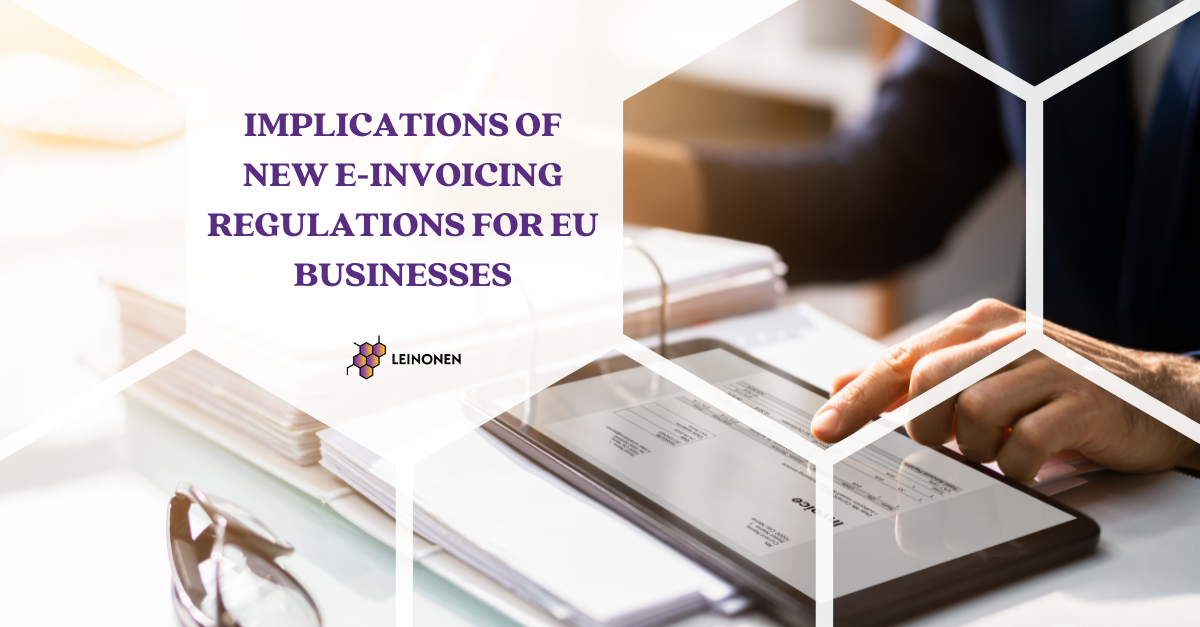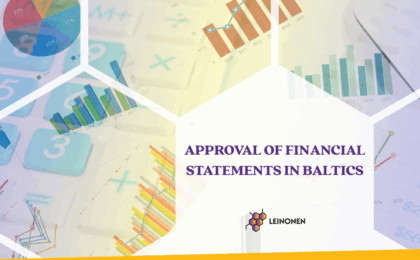What do New E-invoicing Laws Mean for Local and Foreign-owned Businesses in the EU? All countries in the European Union (EU) will soon be required to have a functional e-invoicing system. This is according to a new directive by the European Commission.
This new initiative will affect all local and foreign-owned businesses that send or receive invoices to or from suppliers or clients in the EU. With some countries being further ahead than others in the implementation of standardised electronic invoicing systems, it is important to stay up to date on ever-changing deadlines and requirements.
What is Electronic Invoicing?
Electronic invoicing (e-invoicing) is a modern and fully digitalised way of exchanging invoice documents between suppliers and buyers. An e-invoice is not the same as sending a PDF invoice or using an accounting software. Rather, e-invoices contain secure, machine-readable data that can be imported into a buyer’s Account Payable (AP) system automatically. E-invoicing is more secure and accurate than traditional invoicing; with no manual input of data required, the risks of human data entry errors are eliminated.
Why is the EU Switching to Mandatory E-invoicing?
The VAT in the Digital Age (ViDA) initiative aims to ensure the fair and efficient collection of VAT for businesses selling services or goods to customers in the EU. First proposed in 2022 by the European Commission, this plan aims to fight tax fraud by introducing measures like new VAT reporting obligations and single EU VAT registration. Digitalisation is a large part of this initiative, with switching to electronic invoicing being the first step.
When is Full E-invoicing Being Introduced in the EU?
2028 is the current planned timeline for switching to electronic invoicing, but each country is free to establish its own timeline. Lack of digitalisation across many companies means the changes are slow, requiring a great deal of time and expertise to implement. For example, e-invoicing should already be in place for B2G, however the realistic picture is different. Technical obstacles and a lack of preparedness from governments mean it is still a way off in most EU countries.
Considering the above points, 2030 is perhaps a more realistic prospect for the full switch to e-invoicing in the EU.
Which Countries Already use E-invoicing in the EU?
Scandinavia have adapted to electronic invoicing the best so far. Finland, Norway and Estonia already have functioning e-invoicing systems for B2G. Estonia and Finland also use e-invoicing for B2B. In Norway, electronic invoicing is not yet compulsory, but it is widely used.
What is the Current E-invoicing Picture in Other EU Countries?*
- Having failed to meet an earlier goal of July 1, 2024, France’s current target is September 1, 2026.
- Romania has a new economic system and is making some slow progress towards electronic invoicing.
- Spain has no deadline at present.
- Hungary introduced a centralised anti-VAT fraud, real-time invoice reporting (RTIR) model in 2018.
- Germany’s target for bringing internal B2B e-invoicing up to EU standards is January 2025.
- Italy successfully switched to electronic invoicing on January 1, 2024.
- Belgium is in the planning stages. E-invoicing for internal B2B taxpayers is expected by January 1, 2026.
- E-invoicing is mandatory for B2G in public requirement cases in Lithuania, but does not have to be in accordance with EU standards. The overall deadline is unclear, but there are some talks of 2026.
- At the end of 2023, Ireland held a public consultation with businesses (mainly SMEs) on current thoughts on and barriers to the modernisation of VAT administration with e-invoicing.
- In Latvia, the Ministry of Finance (FM) submitted a draft amendment to the Accounting Law for public consultation on May 24. This amendment stipulates that invoices will have to be issued as a structured e-invoice. It has been proposed that this will come into force on January 1, 2025 for companies issuing invoices to budget institutions. For other companies, the change will be applicable from 2026.
*It is important to note that none of the above dates are guaranteed to stay the same – they are often altered.
What if a Business Does not Want to Move to E-invoicing?
Ultimately, the move to e-invoicing in the EU is mandatory. This means that if a company does not make the switch in time, they will be subject to sanctions or disadvantages. For example, VAT registered businesses may not be able to apply relevant VAT reductions. Not moving to e-invoicing would also mean a company cannot work with partners who have switched. And for companies with a yearly income of more than €40k, non-compliance will ultimately result in a fine.
How can Leinonen Help Businesses Prepare for E-invoicing in the EU?
For more than three decades, Leinonen have been providing expert accounting, payroll and tax services for local and foreign-owned businesses in the EU. With current operations in 11 countries, our 240+ cross-border and local experts have more than 1500 satisfied customers.
Depending on where in the EU a company is located, making the switch to e-invoicing can be challenging and time-consuming. But with the most accurate and up-to-date knowledge on constantly shifting e-invoicing requirements and deadlines across the EU, Leinonen can make the transition a breeze.
To find out how Leinonen could help your local or foreign-owned business prepare for e-invoicing in the EU, arrange a consultation today.




